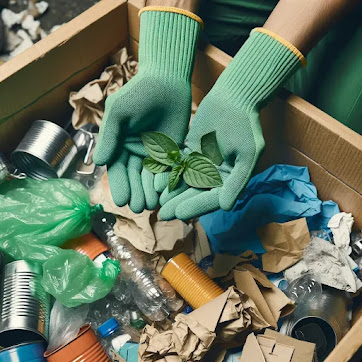Welcome to the heart of Florida's healthcare hub – Jacksonville. Amidst the bustling hospitals, clinics, and medical facilities, there's a silent yet crucial player ensuring the safety of patients and the environment: medical waste management. In this article, we delve into the intricate world of medical waste services in Jacksonville, shedding light on their vital role in maintaining public health and safety. From understanding the types of medical waste generated to exploring the environmental impact and regulatory framework, join us on a journey behind the scenes of Jacksonville's healthcare system.
Understanding Medical Waste
Medical waste is more than just discarded bandages and used syringes. It encompasses a wide array of materials, including infectious waste, sharps, and pharmaceuticals, each carrying potential risks if not handled properly. Understanding the nuances of medical waste is paramount to ensuring its safe disposal and minimizing hazards to healthcare workers, patients, and the community at large.
The Environmental Impact
1. Contamination of Soil and Water Sources: Improper disposal of medical waste can lead to the contamination of soil and water sources, jeopardizing ecosystems and human health. Hazardous chemicals, pathogens, and pharmaceutical residues leaching from improperly disposed waste can seep into the ground, affecting soil quality and contaminating groundwater reserves.2. Air Pollution: Incineration, a common method for
medical waste disposal, releases harmful pollutants into the air, contributing
to air pollution and respiratory illnesses. Medical waste services in
Jacksonville implement advanced air filtration systems and adhere to strict
emission standards to minimize the environmental impact of incineration
processes.
3. Impact on Wildlife: Discarded medical waste, such
as plastics and sharps, poses risks to wildlife. Marine animals may ingest or
become entangled in medical waste materials, leading to injury or death.
Additionally, pharmaceutical residues entering water bodies can disrupt aquatic
ecosystems and harm marine life. Medical waste services in Jacksonville
prioritize proper waste containment and disposal to mitigate these risks and
protect wildlife habitats.
4. Long-term Effects: The environmental impact of
medical waste extends beyond immediate concerns, with long-term consequences
for ecosystems and biodiversity. Persistent organic pollutants present in
medical waste can accumulate in the environment, posing ongoing threats to ecological
balance and human health. Sustainable waste management practices, including
recycling and waste-to-energy initiatives, help minimize the long-term
environmental footprint of medical waste in Jacksonville.
Regulatory Framework
In Jacksonville, as in any city, strict regulations govern
the handling, transportation, and disposal of medical waste. Compliance with
these regulations is not only a legal requirement but also essential for
protecting public health and safety. Understanding the regulatory framework
ensures that healthcare facilities and waste management services adhere to the
highest standards, minimizing risks associated with improper waste disposal.
The Role of Medical Waste Services in Jacksonville
Medical waste services in Jacksonville serve as the frontline defenders against the hazards posed by medical waste. From collection and transportation to treatment and disposal, these services play a pivotal role in ensuring that medical waste is managed safely and efficiently. By partnering with reliable waste management companies, healthcare facilities in Jacksonville can uphold the highest standards of waste disposal, protecting both the community and the environment.
Case Studies: Best Practices in Medical Waste Management
Through real-world examples, we explore the best practices adopted by healthcare facilities in Jacksonville for managing medical waste. From innovative waste segregation techniques to sustainable disposal methods, these case studies highlight the positive impact of effective waste management strategies on public health and environmental sustainability.
Challenges and Solutions
2. Public Awareness: Educating the public about the
importance of proper medical waste disposal is crucial for fostering a culture
of responsible waste management. Medical waste services in Jacksonville engage
in community outreach and education initiatives to raise awareness about the
risks associated with improper waste disposal and promote best practices among
residents, healthcare providers, and businesses. By empowering the community
with knowledge and resources, medical waste services contribute to a safer and
healthier environment for all.
Community Awareness and Engagement
1. Educational Campaigns: These services lead
initiatives to inform the public about safe medical waste disposal practices,
organizing workshops and distributing informational materials.
2. Outreach Programs: Collaborating with local
organizations, they host events like cleanup drives and recycling programs,
encouraging community participation.
3. Support for Best Practices: Medical waste services
offer guidance to healthcare facilities and businesses, helping them implement
effective waste management strategies and comply with regulations.
4. Community Feedback: Seeking input through surveys
and public forums, these services ensure that community concerns are addressed,
fostering trust and collaboration.
Future Perspectives
As technology continues to evolve, so too will the landscape of medical waste management. From automated waste tracking systems to advanced treatment methods, the future holds promising innovations for the industry. By staying at the forefront of these developments, medical waste services in Jacksonville can continue to improve efficiency, safety, and sustainability in waste management practices.
In conclusion, as we emphasize the critical importance of medical waste removal in safeguarding both health and the environment, there's still much to uncover and discuss. For further insights, in-depth analysis, and ongoing conversations about the essential role of medical waste removal, we invite you to visit our blog. Let's work together to ensure a healthier and cleaner future for our communities. Join us on our blog to delve deeper into the vital role of medical waste removal and its impact on health and the environment.


Comments
Post a Comment